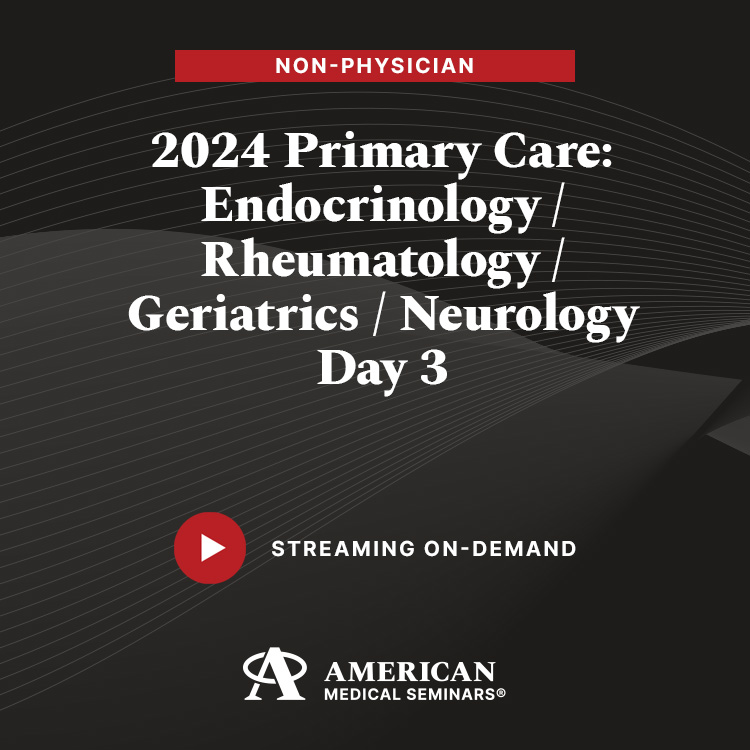Title: Primary Care: Endocrinology/Rheumatology/Geriatrics/Neurology – Day 3 (Non-Physician)
Faculty: Lawrence H. Brent, M.D.; Stephen Winters, M.D.; Danya Khoujah, MBBS, MEHP
Release Date: 7/1/2024 Expiration Date: 7/1/2027
Day 3
Spondyloarthropathies
Attendees of this presentation should be able to:
- Distinguish the clinical features of the different spondyloarthropathies to improve diagnostic accuracy.
- Utilize clinical features, laboratory studies, and radiological studies to make a diagnosis of axial spondyloarthropathy.
- Prescribe pharmacologic agents according to ACR and EULAR recommendations and evidence-based results from clinical trials for patients with spondyloarthropathies.
Septic (Infectious) Arthritis
Attendees of this presentation should be able to:
- Determine the risk factors associated with septic arthritis
- Utilize the British Society of Rheumatology Guidelines for management of the hot swollen joint in adults to differentiate septic arthritis from other causes of acute monoarticular arthritis
- Utilize epidemiological and clinical clues to determine bacterial ethology in patients with septic arthritis
Thyroid Case Studies
Upon completion of this session, using evidence-based medicine and clinical practice guidelines, to include the American Thyroid Association Guidelines, the participant should be able to:
- Appreciate the role of a diagnostic thyroid scan or ultrasound.
- Evaluate a patient for hyperthyroidism.
- Prescribe therapeutic options for parents diagnosed with hypothyroidism.
Cushing Syndrome and other Functional Disorders of the Adrenal
Upon completion of this session, using evidence-based medicine and clinical practice guidelines, to include Endocrine Society Practice guidelines, the participant should be able to:
- Outline the etiologies of Cushing syndrome.
- Evaluate a patient with an adrenal tumor.
- Evaluate a patient for suspected hyperaldosteronism.
- Employ strategies to appropriately diagnosis and manage patients with pheochromocytoma
Disorders of Calcium Metabolism
Upon completion of this session, using evidence-based medicine from the JCEM, Annual of IM and others, the participant should be able to:
- Distinguish the causes of hypercalcemia.
- Recognize secondary hyperparathyroidism.
- Be aware of the indications for surgical intervention using clinical practice guidelines for
- asymptomatic hyperparathyroidism.
- List the causes of hypocalcemia.
- The receipt for any incentive-associated purchase will designate the value of the gift card separately from the cost of the learning activity.
- This incentive may have implications on your tax reporting obligations. Any reimbursed amount must be declared as personal income for tax purposes.

